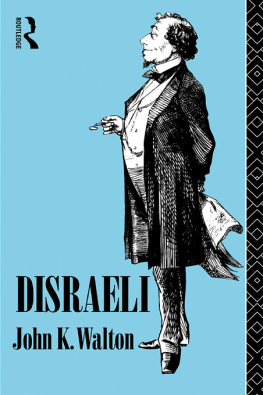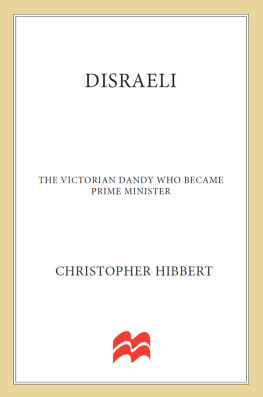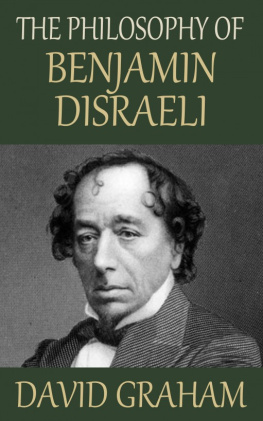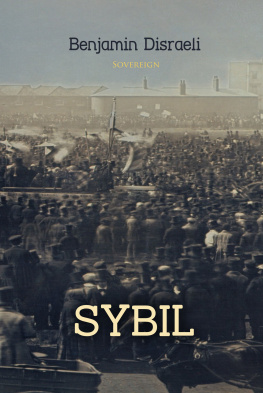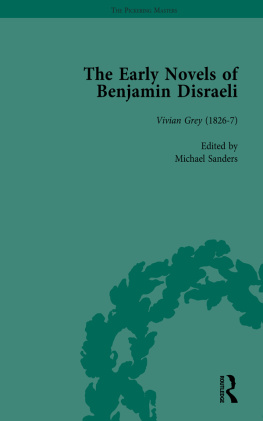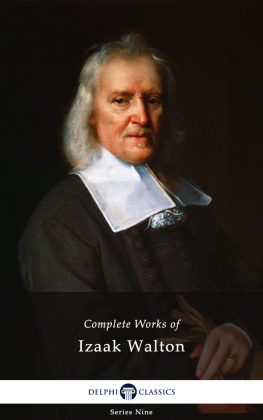First published in 1990 by Routledge
11 New Fetter Lane,
London, EC4P 4EE
Simultaneously published in the USA and Canada by Routledge a division of Routledge, Chapman and Hall, Inc.
29 West 35th Street,
New York, NY 10001
This edition published in the Taylor & Francis e-Library, 2008.
To purchase your own copy of this or any of Taylor & Francis or Routledges collection of thousands of eBooks please go to www.eBookstore.tandf.co.uk.
1990 John K. Walton
British Library Cataloguing in Publication Data
Walton, John K.
Disraeli. (Lancaster pamphlets).
1. Great Britain. Disraeli, Benjamin, 18041881
I. Title II. Series
941.0810924
ISBN 0-415-00059-9 (Print Edition)
Library of Congress Cataloging in Publication Data
Walton, John K.
Disraeli/John K. Walton.
p. cm. (Lancaster pamphlets)
Includes bibliographical references.
ISBN 0-203-12932-6 Master e-book ISBN
ISBN 0-203-19108-0 (Adobe eReader Format)
ISBN 0-415-00059-9 (Print Edition)
1. Disraeli, Benjamin, Earl of Beaconsfield, 18041881.
2. Great Britain Politics and government 18371901.
I. Title. II. Series.
DA564.B3W34 1990
941.081092 dc20
[B]
90-32995
CIP
All rights reserved. No part of this book may be reprinted or reproduced or utilized in any form or by any electronic, mechanical or other means, now known or hereafter invented, including photocopying and recording, or in any information storage or retrieval system, without permission in writing from the publishers.
Foreword
Lancaster Pamphlets offer concise and up-to-date accounts of major historical topics, primarily for the help of students preparing for Advanced Level examinations, though they should also be of value to those pursuing introductory courses in universities and other institutions of higher education. Without being all-embracing, their aims are to bring some of the central themes or problems confronting students and teachers into sharper focus than the textbook writer can hope to do; to provide the reader with some of the results of recent research which the textbook may not embody; and to stimulate thought about the whole interpretation of the topic under discussion.
Acknowledgements
My thanks go to David King, for characteristically thorough and probing comments on the original draft of this pamphlet. My special thanks go to Judith Rowbotham, who not only gave me the benefit of her expertise on mid-Victorian colonial policy, but also contrived to suggest improvements and provide insights throughout the text. I hope she will forgive my incorrigible and unrepentant attachment to the practice of beginning sentences with conjunctions. At times I have undoubtedly rejected good advice in other respects as well, and I wish to make it clear that all responsibility for errors remains mine and mine alone.
JKW
The image and the myth
Benjamin Disraeli is one of those rare politicians whose importance adds up to more than the sum of their deeds. His time in office was short, and he headed only one lasting ministry, at the very end of his career, but he remains a figure of compelling interest, to many of todays practising politicians as well as to historians. The nature and extent of his influence on the long-term development and sustained success of the Conservative Party are matters for highly-charged debate, and the mystique he cultivated was so powerful that mention of his name can still evoke enthusiastic partisan responses, while Conservative leaders continue to squabble over the inheritance of his mantle.
The issues of debate which swirl around Disraelis legacy are enduring in their significance. At three points, most obviously, he has a high profile in the political history of Victorian Britain. In the first place, his vituperative rhetoric was displayed to savagely damaging effect in the debates of 18456, on Catholics and the Corn Laws, which culminated in the defeat of Peels government and the effective destruction of the new flexible Conservative Party which Peel had been constructing during the 1830s and 1840s. This spectacular rift left the Conservatives, shorn of their Peelite leadership and a significant proportion of their rank and file, to wander the wilderness of opposition and occasional minority government for a generation as die-hard defenders of the Church of England and the landed interest. The importance of Disraelis part in this is open to question. Was his oratorical contribution an essential, causal element in the course of events, or did his interventions merely affect the language, style and tone of a rift which was bound to occur in some form, at some time in any case? Whatever the conclusion, Disraelis place at the vortex of one of the great controversies of modern British political history is secure.

